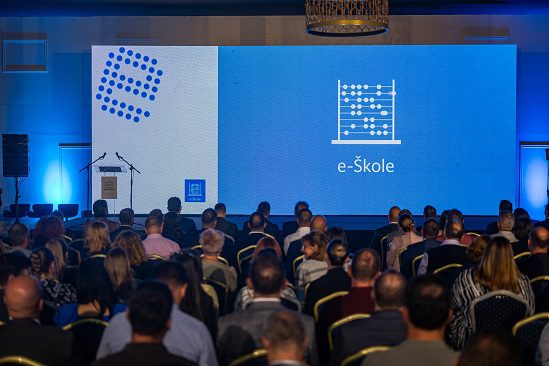Croatian Academic and Research Network – CARNET celebrated the completion of the e-Schools program, one of the largest projects for the digitalization of the primary and secondary education system. Valued at a total of 212 million euros, the e-Schools program, over the last eight years, has contributed to strengthening the capacity of the primary and secondary education system, ensuring students are prepared for further education and lifelong learning, and are ready to enter the job market.
The full program name, “e-Schools: Comprehensive Informatization of School Business and Educational Processes to Create Digitally Mature Schools for the 21st Century,” enabled the implementation of modern teaching methods. Classrooms were equipped with digital technologies, allowing teachers to use digital educational content, expand communication beyond the physical classroom, and encourage a more active role for students in the educational process. Digitally competent teachers are prepared to introduce and apply innovations in their pedagogical practices, while school management is efficient and transparent.
“I congratulate CARNET on the successful implementation and results of the e-Schools project. Alongside the concept of digital maturity, I would like to emphasize the human dimension of the project, which involves continuous support and training for personnel in the education system. As the Minister, I am particularly pleased that the knowledge and experience gained from such a significant project have been utilized by CARNET for new projects worth more than 120 million euros,” stated Prof. Dr. Radovan Fuchs, Minister of Science and Education.
From March 2015 to September 2018, the pilot project “e-Schools: Establishment of a System for Developing Digitally Mature Schools” was conducted. The pilot’s results laid the groundwork for the second phase of the program, titled “e-Schools: Development of Digitally Mature Schools (Phase II),” which encompassed all primary and secondary schools in Croatia funded from the state budget, totaling 1321 schools, including 907 primary, 364 secondary, and 50 art schools and centers for education and training.
As part of the project, activities included designing the network of schools at over 2400 locations of primary and branch schools, installing active network equipment, establishing functional wireless networks, delivering over 85,000 laptops for school staff for use in teaching, and facilitating the development of new e-services. To familiarize educational staff with new technologies and teaching methods, around 70 different workshops, webinars, and e-courses were offered, attended by almost 70,000 participants. The project also produced 98 digital educational contents, 1440 teaching scenarios for subjects, 350 teaching scenarios for interdisciplinary themes with 119 corresponding interactive contents.
e-Schools have enabled the implementation of modern teaching methods in classrooms equipped with digital technologies. Teachers can use digital educational content, expand communication beyond the physical classroom, and encourage a more active role for students in the educational process. Digitally competent teachers in digitally mature schools are now ready to introduce and apply innovations in their pedagogical practices,” emphasized Hrvoje Puljiz, Director of CARNET.
Due to the comprehensiveness and specificity of the e-Schools project’s goal, each phase of the project’s implementation was financially supported by 85% through two operational programs: the Operational Program Competitiveness and Cohesion and the Operational Program Efficient Human Resources. The remaining funds were provided through the state budget.
The value of e-Schools was recognized by the European Commission, and in 2020, the project won first place in the category of Inclusive Growth – Skills and Education for Digital Europe at the Regiostars Awards, acknowledging its importance in applying modern technology, digital content, and support to provide equal opportunities for the education of all students. Last year, EU citizens selected e-Schools as the second-best project in the field of regional development financed by the European Union in the past 15 years.



